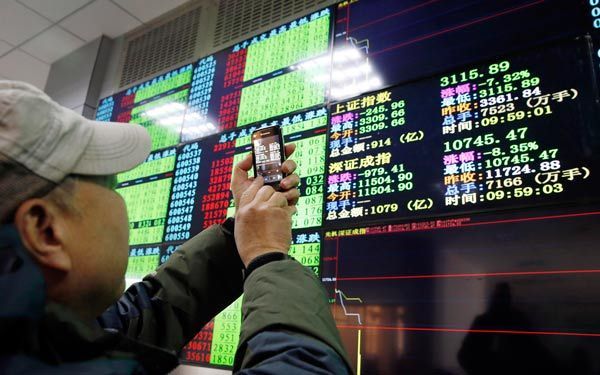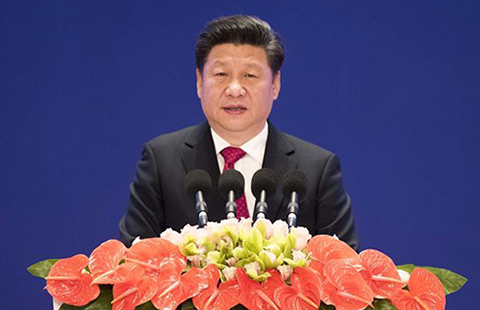Regulator faces test to reform flawed market
By Li Xiang (chinadaily.com.cn) Updated: 2016-01-17 20:45
 |
|
A man takes a photo of the trading screen at a securities brokerage in Shanghai on Thursday. [Photo/China Daily] |
Securities chief vows to learn from past mistakes in speech, but unlikely to allay investors' concerns, say analysts
The current stock market volatility will challenge the Chinese regulator's ability to respond and implement reform, analysts said after the country's securities chief acknowledged deep flaws in the system.
Xiao Gang, chairman of the China Securities Regulatory Commission, delivered a lengthy speech at the authority's annual work meeting on Saturday in which he said the market rout since the summer had exposed many loopholes and deficiencies.
The "abnormal" volatility reflected the immaturity of the Chinese market and its investors, incomplete trading rules, and an incompetent regulatory system, he said.
The commission has come under growing criticism from investors for its handling of the stock market turmoil. China's A-share market plummeted at the start of the year after rebounding from a 34 percent loss in the summer. The benchmark index tumbled 18 percent in less than two weeks, closing in on the technical measure of a bear market (20 percent).
The controversial circuit breaker, which was suspended by the regulator just four days after its introduction, stoked further anger among investors, who said it heightened market volatility and aggravated the liquidity crunch.
Analysts contacted by China Daily over the weekend said Xiao's comments point to further reform efforts in the future to stabilize the stock market.
In his speech, the chairman vowed that the regulator would learn from its past mistakes. However, this is unlikely to sooth investors' concerns in the short term, said Dong Dengxin, a finance researcher at Wuhan University of Science and Technology.
"The ultimate question is how to restore the commission's role as a referee rather than a market player," he said. "That will involve reducing direct administrative intervention, and enhancing effective market oversight and regulation."
A recent report by global rating agency Moody's said the persistent volatility in the financial markets illustrates the scale of the reform challenge.
"Coming soon after the stock market turmoil in mid-2015, this second episode suggests that China's authorities are finding it increasingly difficult to reconcile the tensions inherent in designing and implementing credible and effective reform measures while maintaining economic, financial and social stability," the report said.
Xiao's speech also failed to calm the anxiety among retail investors, the dominant players in the A-share market.
"I've been very disappointed with the regulator's risk management and its professional capability, in particular the introduction of the circuit breaker, and its handling of share sales by major shareholders of listed companies," a retail investor in Guangdong province who gave his name only as Gao said on Sunday.
General dissatisfaction has also been highlighted by the fact one investor from Zhejiang province, Xu Caiyuan, has filed a lawsuit against the securities commission at a court in Beijing, accusing the body of misconduct.
- Over 1,000 coal mines in China to be shut down
- Li addresses founding conference of AIIB council
- China to further open up capital market: regulator
- Baidu faces punishment over porn, libel
- Hong Kong Airlines will have 10 more international destinations in 2016
- Full text of Chinese President Xi Jinping's address at AIIB inauguration ceremony
- JD.com's Internet finance arm lands $1.01 billion in funding
- AIIB holds inaugural meeting

















